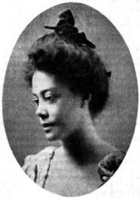Alice Dunbar-Nelson
Alice Dunbar-Nelson Poems
Alice Dunbar-Nelson Biography
Alice Ruth Moore Dunbar Nelson (July 19, 1875 - September 18, 1935) was an American poet, journalist and political activist. Among the first generation born free in the South after the Civil War, she was one of the prominent African Americans involved in the artistic flourishing of the Harlem Renaissance. Her first husband was the poet Paul Laurence Dunbar; she then married physician Henry A. Callis; and last married Robert J. Nelson, a poet and civil rights activist. Alice Ruth Moore was born in New Orleans to middle-class parents Patricia Wright, a seamstress and former slave, and Joseph Moore, a merchant marine, who were people of color and part of the traditional multiracial Creole community of the city. At a time when fewer than 5% of any people went to college, Moore graduated from Straight University (now Dillard University) in 1892 and started work as a teacher in the public school system of New Orleans. In 1895 her first collection of short stories and poems, Violets and Other Tales,[1] was published by The Monthly Review. About that time, Moore moved to New York. She co-founded and taught at the White Rose Mission (White Rose Home for Girls) in Brooklyn. Beginning a correspondence with the poet and publisher Paul Dunbar, she ended up moving to Washington, DC to join him when they married in 1898. She and Paul Dunbar separated in 1902 but were never divorced. He was reported to have been disturbed by her lesbian affairs. Paul Dunbar died in 1906. Alice Dunbar then moved to Wilmington, Delaware and taught at Howard High School for more than a decade. In 1910 she married Henry A. Callis, a prominent physician and professor at Howard University, but this marriage ended in divorce. From 1913 to 1914, Dunbar was coeditor and writer for the A.M.E. Review, an influential church publication produced by the African Methodist Episcopal Church (AME Church). In 1916 she married the poet and civil rights activist Robert J. Nelson. She joined him in becoming active in politics in Wilmington and the region. They stayed together for the rest of their lives. From 1920, she coedited the Wilmington Advocate, a progressive black newspaper. She also published The Dunbar Speaker and Entertainer, a literary anthology for a black audience. Alice Dunbar Nelson was an activist for African Americans' and women's rights, especially during the 1920s and 1930s. While she continued to write stories and poetry, she became more politically active in Wilmington, and put more effort into numerous articles and journalism on leading topics. In 1915 she was field organizer for the Middle Atlantic states for the woman's suffrage movement. In 1918 she was field representative for the Woman's Committee of the Council of Defense. In 1924 Dunbar-Nelson campaigned for the passage of the Dyer Anti-Lynching Bill, but the Southern Democratic block in Congress defeated it.)
The Best Poem Of Alice Dunbar-Nelson
Sonnet
I had no thought of violets of late,
The wild, shy kind that spring beneath your feet
In wistful April days, when lovers mate
And wander through the fields in raptures sweet.
The thought of violets meant florists' shops,
And bows and pins, and perfumed papers fine;
And garish lights, and mincing little fops
And cabarets and songs, and deadening wine.
So far from sweet real things my thoughts had strayed,
I had forgot wide fields, and clear brown streams;
The perfect loveliness that God has made,--
Wild violets shy and Heaven-mounting dreams.
And now--unwittingly, you've made me dream
Of violets, and my soul's forgotten gleam.
